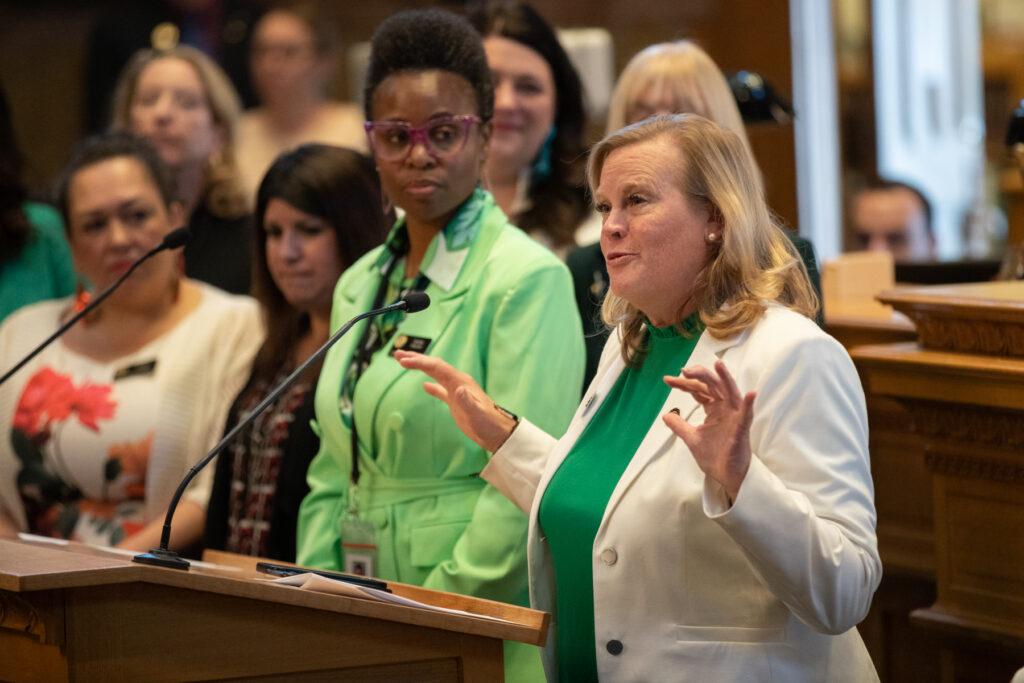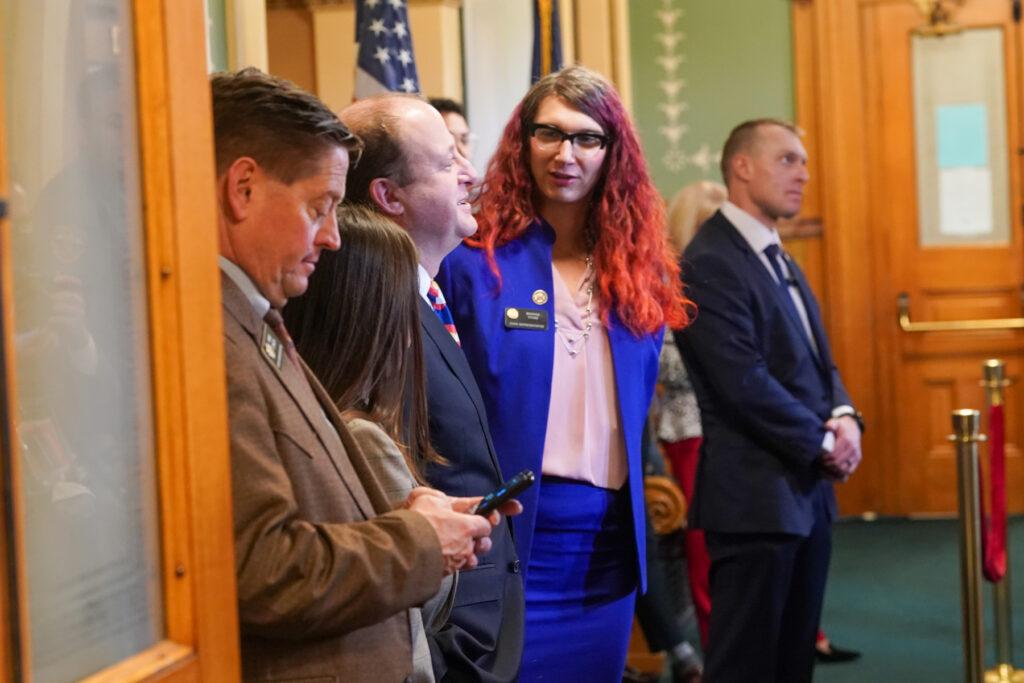
Updated 3:02 p.m.
As other states move to ban abortion and outlaw gender affirming care for minors, Democrats in Colorado’s legislature want to extend new legal protections to providers and people who get those treatments here.
Another measure would increase insurance coverage for abortions and other reproductive care.
Starting in 2025, large employer plans in Colorado would have to provide coverage for the total cost of an abortion without policy deductibles, copayments or coinsurance. Employers would be exempted if it conflicted with their sincerely held religious beliefs.
The final bill in the package would set restrictions on how crisis pregnancy centers — which generally seek to convince pregnant women not to abort — can advertise their services, including making claims that they can reverse a medication abortion, a scientifically controversial procedure.
“This practice is not only dangerous and unregulated, but evidence shows that these pills cannot even reverse an abortion,” said Democratic state Rep. Elisabeth Epps, one of the main sponsors of that bill, at a press conference at the Capitol to unveil the package.
Abortion access has been a major focus for Democratic lawmakers in Colorado since it became clear the U.S. Supreme Court was on the path to overturning Roe v. Wade.
In 2022, Gov. Jared Polis signed the Reproductive Health Equity Act to codify legal abortion in state law, but advocates say it doesn’t go far enough and more laws are needed given the restrictions passed elsewhere, including neighboring states.
"We knew we were establishing this fundamental right, but that we still weren't really solving the problem of access," said Democratic state Rep. Meg Froelich, one of the bill’s main sponsors.
She said the new bills have been in the works for months, but were hard to finalize, as backers have tried to respond to policies moving through other states.
“I call it experiments in cruelty, in between offering bounties and trying for subpoenas, and punishing doctors and punishing people for seeking information about doctors. And of course, all of that resulting in folks coming to Colorado.”
While a number of states have restricted or banned abortions and gender-affirming care for minors in the past year, none have so far passed laws that punish people for going to other states for treatment.
In a concurring opinion to the Supreme Court’s Dobbs ruling, Justice Brett Kavanaugh said the court might not look favorably upon laws that regulate freedom of movement between states, but no part of the Dobbs ruling clearly weighs in on the constitutionality of such policies.

What the proposal would do
Under the proposal, Colorado would not participate in any out-of-state investigations involving providers or recipients of abortion or gender-affirming care. That would include ignoring search warrants, arrests, subpoenas, summons, or extraditions to another state, as long as the activity took place in Colorado and there is no indication those involved broke Colorado law.
It also seeks to prevent Colorado medical providers from facing professional sanctions here, if they are found guilty of breaking another state's law banning abortion or gender-affirming treatment. And it would restrict health insurers, medical malpractice insurers and those who provide contracts and licenses for medical professionals from retaliating against them.
Those providers and people who assist patients would also be allowed to remove their personal information from the internet, expanding a state law to protect domestic violence victims and county health workers and other groups from threats and harassment.
“You're punishing providers, you're punishing all the people involved, the helpers, the drivers, it really is nefarious and it's spread so far,” Froelich said
The proposals are expected to receive swift pushback from the GOP
Last year’s bill to codify the right to an abortion unfolded on completely partisan lines, without a single Democrat opposing it and not one Republican voting for it. It also prompted some of the longest debates at the capitol in recent memory, with the two chambers devoting more than 40 hours to arguing over it.
Republicans have said measures to expand abortion access are morally wrong and would make Colorado the nation’s most “abortion-friendly” state. Colorado is among the few states without any restrictions on when an abortion can be performed during pregnancy.
“For me, it's fighting for the right of the unborn,” said Republican state Rep. Brandi Bradley.
“That's my worldview. My worldview is that we are all knitted in the womb and I'm not gonna change my worldview.”
Bradley said she’ll make it her duty to debate late into the night on each of the bills to represent her constituents in Douglas County. She said part of what motivates her is personal. She had a twin pregnancy end with one of her children stillborn.
She said just because her daughter wasn’t born alive doesn’t mean she wasn’t a living being.
“What's the purpose of an ultrasound?” Bradley asked. “What is the purpose of reproductive health? What is the purpose of listening to a heartbeat every time you go to a doctor's appointment? What is the purpose of that, if you're gonna tell me that that's not a life?”
Many of the new provisions Democrats hope to enact this year would codify into law an executive order Polis signed in 2022.
“We are taking needed action to protect and defend individual freedom and protect the privacy of Coloradans,” said Polis in a statement announcing the executive order.
According to advocates for legal abortion, as of January 2023, two dozen states have banned or placed severe restrictions on the procedure.

Making Colorado proactive on providing gender-affirming care to trans youth
A growing number of states are also banning medical care for trans youth, including puberty blockers or hormones. The consensus of the medical community is that gender-affirming treatments for trans youth are effective and can save lives by reducing suicides.
“We wanna protect people that are coming here to get services,” said Democratic state Rep. Brianna Titone, one of the bill’s main sponsors.
She had hoped to introduce a bill last session, but Democratic leaders said they didn’t think there was enough time to move it forward in the last part of the legislative session. It was also a political fight some were wary of having in an election year.
Titone, who is Colorado’s first openly transgender state lawmaker, said last year she helped an out-of-state family that needed gender-affirming care for their child move to Colorado, and called what’s happening in other states, “violations against basic human rights laws."
"Basically, we're creating refugees in our own country.”
She said she wants Colorado to be proactive on these issues.
“We see the writing on the wall. It's time that we start to formulate policies that can combat what might be coming down the hill,” Titone said.
Voters will also likely get a chance to weigh in. Democrats are preparing a ballot question for 2024 that would seek to undo the state’s ban on using state funds to pay for abortion services.
This is a developing story and will be updated.








